Asset Management and Property Management, though interconnected, cater to distinct aspects of investment. Asset Management, carried out by financial services companies, focuses on supervising and growing a client's investments, which could include stocks, bonds, real estate, and more. It requires a deep understanding of market trends and investor profiles to make decisions aimed at long-term growth. On the other hand, Property Management involves the daily administration of real estate properties, encompassing residential, commercial, or industrial types. Property managers ensure properties are well-maintained, tenanted, and profitable, requiring a mix of interpersonal skills and practical knowledge to handle lease agreements and regulatory compliance. Recognizing the differences between these fields is critical in informing investment decisions, resource allocation, and performance expectations. It also helps identify specific career paths or areas for professional development. While the differences may seem subtle, they can profoundly influence an individual's investment journey. Asset Management is a systematic process of developing, operating, and maintaining a client’s assets cost-effectively. Its purpose extends beyond mere maintenance; it’s about maximizing returns on investments. This could mean choosing the right stocks, divesting from non-performing assets, or reallocating resources based on market trends. With the influx of modern tools and platforms, asset management has evolved, now harnessing data analytics and machine learning to make more precise investment decisions. Property Management focuses on the administration of residential, commercial, or industrial real estate. Its chief aim is to maintain the property’s value while generating income. This involves tasks such as tenant acquisition, rent collection, property maintenance, and repair. In the ever-evolving realm of real estate, property managers now also grapple with sustainable building practices, technology integration in properties, and navigating the challenges posed by global events like pandemics. Financial Advisors: They guide clients on investment strategies and decisions. With an ear to the ground, they stay updated on market shifts and emergent investment opportunities. Portfolio Managers: Professionals who make investment decisions and manage a portfolio’s day-to-day operations. They're the strategists, balancing risks and rewards, aiming for the portfolio's sustained growth. Research Analysts: They provide the necessary data and analysis on which investment decisions are based. Their role is increasingly becoming tech-centric, leveraging vast amounts of data to discern patterns and insights. Property Managers: They handle daily operations, from tenant complaints to emergency repairs. Their roles have expanded to include tech integration, like implementing smart home systems or managing properties virtually. Leasing Agents: Professionals dedicated to finding tenants for vacant properties. With the rise of online platforms, they often employ digital strategies to attract potential tenants. Maintenance Crews: They ensure that properties remain in optimal condition. Their tasks can range from basic repairs to overseeing major renovations or installations. Equities: Investment in stocks or shares of companies. With global markets more interconnected than ever, equities offer a vast playing field for investors. Fixed Income Securities: Investments yielding a fixed periodic return, like bonds. They've traditionally been viewed as safer investments, especially during volatile economic times. Real Estate: Physical property or land, including buildings and structures. Real estate can be direct, like owning property, or indirect, such as REITs. Commodities: Tangible goods such as oil, gold, and agricultural products. Commodities markets have their dynamics, influenced by global events, technological advancements, and geopolitical tensions. Residential: Such as apartments, homes, or vacation rentals. With urbanization trends and demographic shifts, residential property management is continually adapting. Commercial: Office buildings, retail spaces, and warehouses. The rise of remote work and e-commerce has reshaped the landscape of commercial properties. Industrial: Factories, storage facilities, and specialized production spaces. As industries evolve, so do the demands and nuances of managing such spaces. Asset Management generally has a broader scope, considering various assets like equities, commodities, and even real estate. Property Management is specialized, focusing only on real estate properties and their day-to-day management. However, both fields demand a keen understanding of market dynamics, regulatory landscapes, and the evolving needs of clients or tenants. While both fields require specialized professionals, asset management leans heavily on financial analysts, advisors, and portfolio managers. These individuals often have backgrounds in finance, economics, and data analytics. Property management, however, is more hands-on, involving property managers, leasing agents, and maintenance crews. These roles demand a mix of industry-specific knowledge, interpersonal skills, and practical expertise. Asset Management aims for long-term wealth accumulation and growth, striving to provide clients with returns that outpace inflation and increase their net worth over time. Property Management focuses on generating consistent rental income and maintaining or increasing property value. The tangible nature of real estate often provides a sense of security, though it comes with its challenges. Portfolio Diversification: Enables risk spreading across various assets. Diversification is often hailed as a free lunch in finance, offering a balance between risk and reward. Risk Management: Professionals continuously monitor and mitigate investment risks. They use sophisticated tools and models to predict market movements and shield portfolios from potential downturns. Potential for Greater Returns: Strategic investments often yield higher returns over the long term. Asset managers continually seek opportunities that promise higher growth, even in saturated markets. Maintenance and Upkeep: Ensures properties remain in prime condition. A well-maintained property can command higher rents and attract better tenants. Tenant Relations: Effective management leads to happier tenants and reduced vacancies. Positive tenant relationships can translate to stable rental income and fewer hassles. Value Appreciation: Well-managed properties often see an increase in market value. This is not just about maintenance but also about understanding market trends and positioning the property accordingly. Market Fluctuations: Assets, especially equities, are vulnerable to market volatilities. Global events, economic downturns, or even company-specific news can significantly impact asset values. Regulatory Concerns: Ever-changing financial regulations can impact investment strategies. It's crucial for asset managers to stay updated and compliant, ensuring that investments remain sound. Liquidity Issues: Some assets may not be easily convertible to cash. This could pose challenges when funds are needed urgently or when market conditions dictate a swift exit. Tenant Challenges: Issues like non-payment of rent or property misuse can arise. It's a perennial challenge, requiring tactful and legal handling by property managers. Unexpected Maintenance Costs: Emergencies can lead to unplanned expenses. Properties, especially older ones, can spring unexpected repairs, impacting profitability. Market Instability: Real estate markets can be unpredictable, affecting property values. Factors like interest rates, economic health, or even local events can influence property prices. Asset Management can be ideal if your goal is to build a diverse portfolio with a wide range of investments like stocks, bonds, or even real estate. Property Management, however, may be more suitable if your goal is focused on real estate, intending to generate income from rentals or property value appreciation. Asset Management often involves more risk due to the volatile nature of markets. The value of stocks, bonds, and other securities can fluctuate significantly over a short period. Property Management, although not risk-free, is generally considered more stable, with property values typically rising over time and rental income providing a steady cash flow. Property Management demands active involvement with responsibilities like tenant management, property maintenance, and regulatory compliance. Asset Management, in contrast, is more passive as the financial services company handles the research, investment decisions, and portfolio diversification. Asset Management often aims for capital appreciation, where the goal is to increase the value of the initial investment over time. Property Management seeks regular income through rental payments, although property value appreciation is also a beneficial factor. If you're risk-averse, diversified assets or stable real estate investments might be preferable. Those open to higher risks might lean more towards equities or commercial properties. Understanding one's risk profile is essential, as it not only influences investment choices but also shapes the investor's peace of mind. It's paramount to align your investment choice with your long-term goals. Whether it's retirement planning, wealth accumulation, or generating passive income, your objectives should dictate your investment path. Periodic reviews and consultations with professionals can also ensure that your strategies evolve with changing personal needs and market conditions. Understanding the differences between Asset Management and Property Management is paramount for making informed investment decisions. These fields, while interconnected, cater to distinct aspects of investment and require different professional expertise. Asset management, typically handled by financial services companies, aims at long-term wealth accumulation, leveraging various assets such as equities, bonds, commodities, and real estate. Conversely, property management focuses solely on the day-to-day administration of real estate properties, striving to generate consistent rental income and maintain or increase property value. Both fields present unique benefits and challenges, underscoring the need for seasoned professionals who can navigate market dynamics, regulatory landscapes, and evolving client needs. As an investor, aligning your choice with your long-term goals, risk tolerance, and preferred level of involvement is critical. To optimize your investment journey and potentially increase your net worth over time, consider seeking professional wealth management services.Asset Management vs Property Management: Overview
Understanding the Basics of Asset and Property Management
Definition and Purpose of Asset Management
Definition and Purpose of Property Management
Key Roles and Responsibilities in Asset and Property Management
Roles in Asset Management
Roles in Property Management
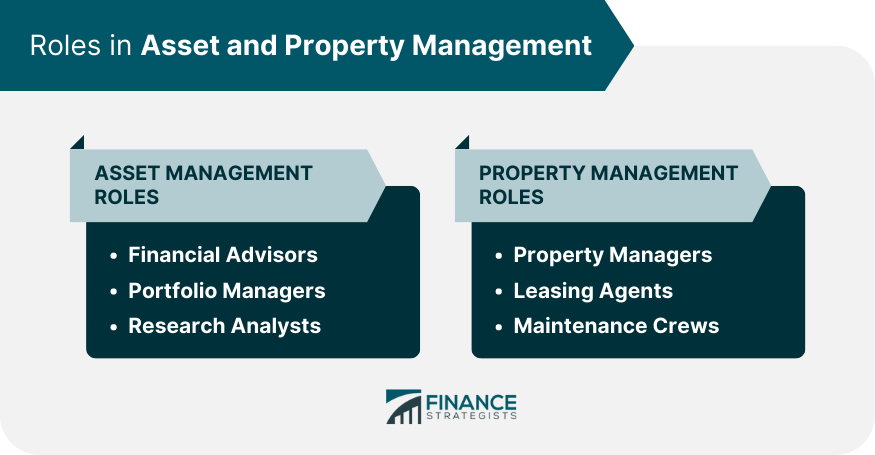
Assets Under Asset and Property Management
Assets Under Asset Management
Properties Under Property Management
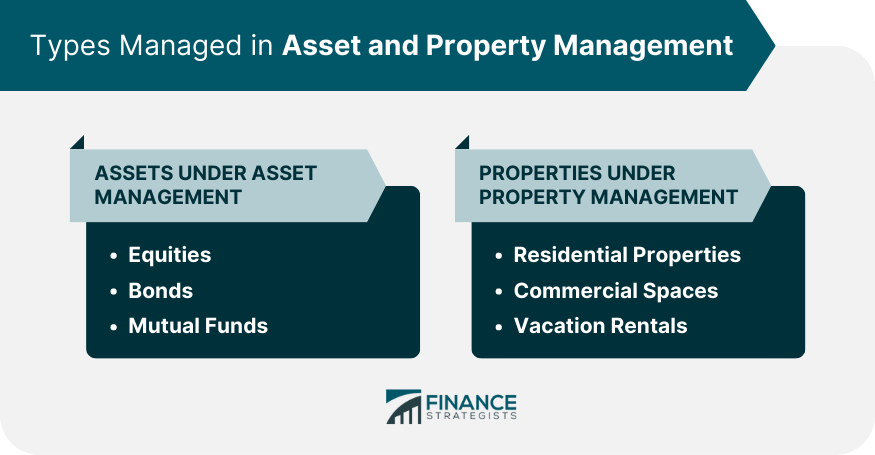
Key Distinctions Between Asset and Property Management
Scope and Scale
Professionals Involved
Investment Goals
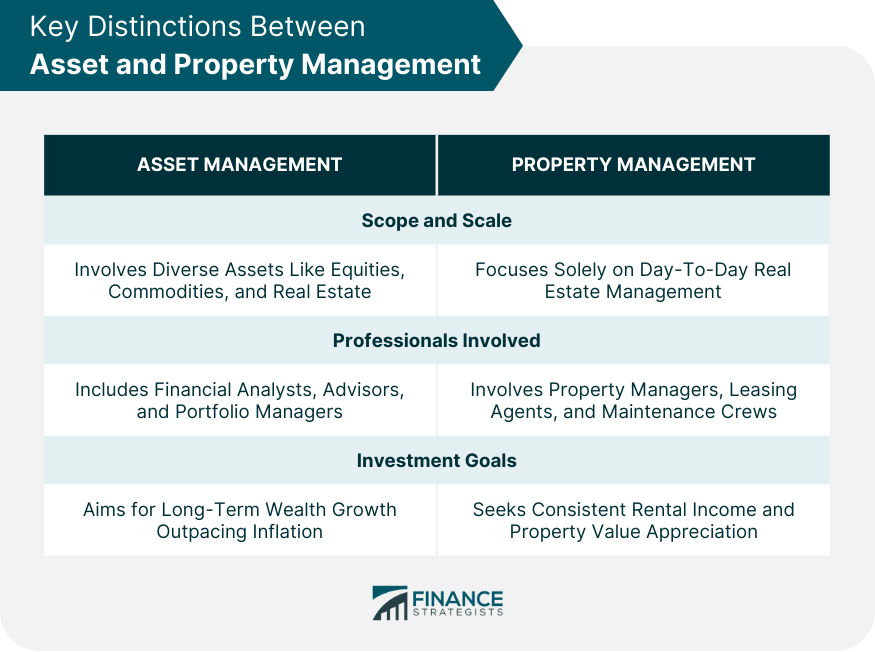
Benefits and Challenges of Asset and Property Management
Advantages of Asset Management
Advantages of Property Management
Challenges in Asset Management
Challenges in Property Management
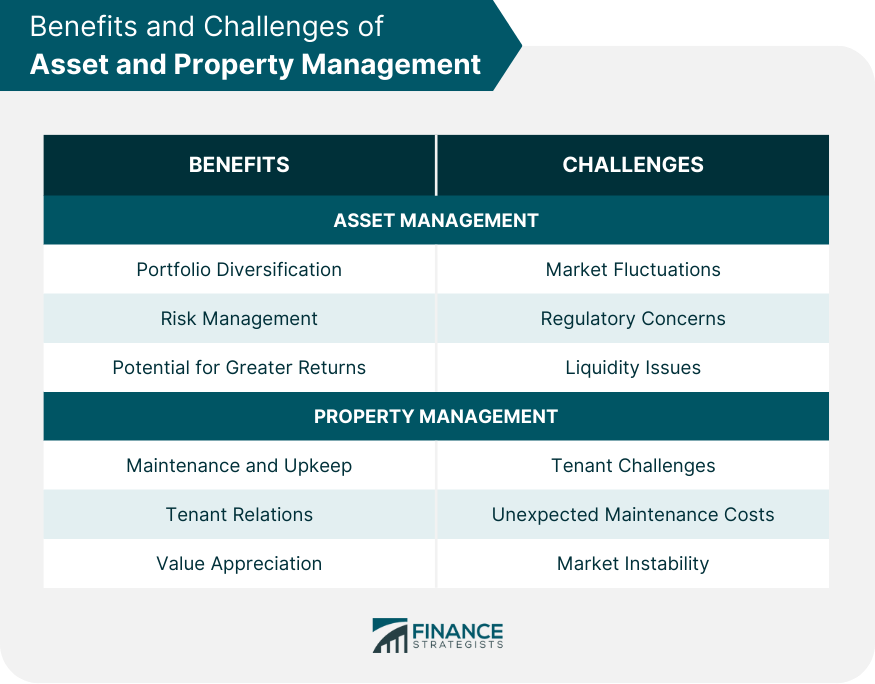
Investing Between Asset and Property Management
Critical Factors to Consider
Financial Goals
Risk Tolerance
Involvement Level
Type of Returns
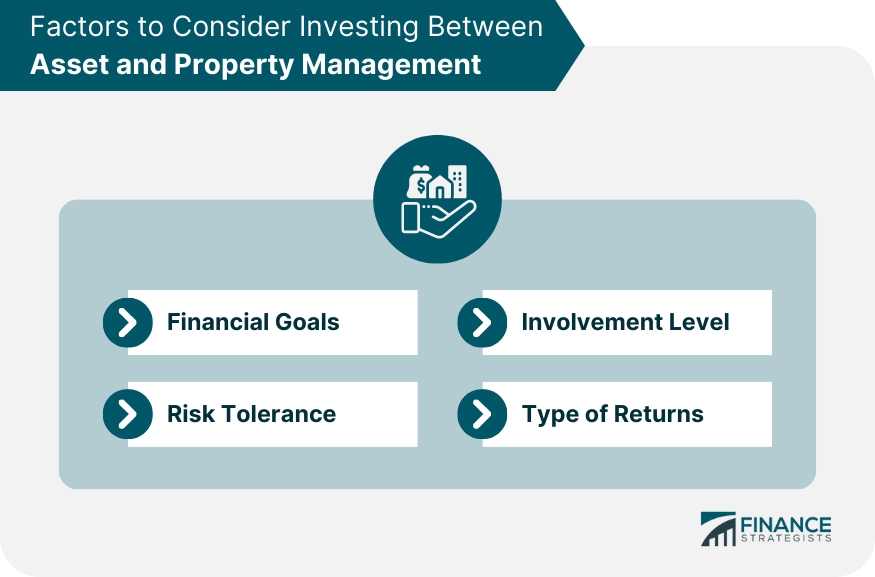
Determining Risk Appetite
Aligning With Long-Term Objectives
Bottom Line
Asset Management vs Property Management FAQs
Asset management focuses on overseeing diverse investments like stocks and bonds, while property management pertains to the day-to-day oversight of real estate properties.
Asset management roles lean towards financial strategizing with advisors and analysts, while property management involves hands-on roles like property managers and maintenance crews.
Asset management offers benefits like portfolio diversification, effective risk management, and the potential for greater returns.
Property management can pose challenges such as tenant issues, unexpected maintenance costs, and real estate market instability.
Your choice should align with your financial goals, risk tolerance, and long-term objectives, potentially consulting with professionals to guide your decision.
True Tamplin is a published author, public speaker, CEO of UpDigital, and founder of Finance Strategists.
True is a Certified Educator in Personal Finance (CEPF®), author of The Handy Financial Ratios Guide, a member of the Society for Advancing Business Editing and Writing, contributes to his financial education site, Finance Strategists, and has spoken to various financial communities such as the CFA Institute, as well as university students like his Alma mater, Biola University, where he received a bachelor of science in business and data analytics.
To learn more about True, visit his personal website or view his author profiles on Amazon, Nasdaq and Forbes.











